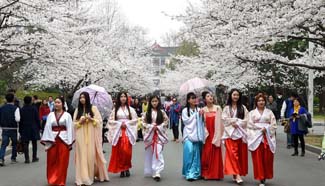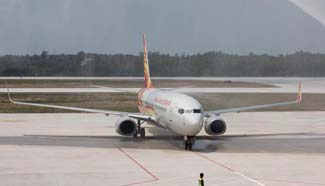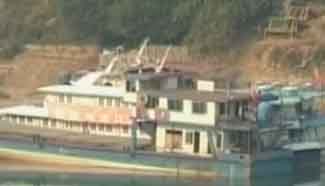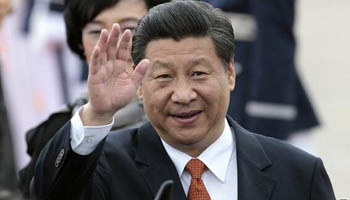Q: What are the task and goals of deepening national defense and military reforms?
A: The task is to make breakthroughs before 2020 in military administration and joint operational command, to optimize the military structure, to enhance policy systems and civilian-military integration, and to build a modern military with Chinese characteristics that can win digitalized warfare.
Q: What does the reform plan mainly involve?
A: The reform mainly intends to push forward changes of the military leadership and management system, to optimize the CMC structure and perfect the management of various services; to improve the system featuring joint command and battle zone commands; to optimize the scale and structure of the military and carry out the reduction of 300,000 in troop numbers; to reform the composition of the army toward the goal of being substantial, integrated, multi-functional and flexible;to establish a new military talent cultivation system in which military academies, training and vocational education are combined and integrated; to push for reform in military policies and regulations, especially in human resources and logistics; to push for deeper integration of civil sector and the military;and to optimize the structure of armed police and its command system. The reform also involves building a courts martial system with Chinese characteristics.
Q: What are the major steps on optimizing the composition of the CMC?
A: Starting with the function of the CMC, we aim to adjust the structure of the CMC and put into practice the multi-department system to highlight the core functions, merge similar functions, and enhance supervision and coordination, while delegating more specific powers to lower-level units, and cutting a large number of staff and departments, in particular those directly affiliated to the CMC. Such change will allow the CMC to be more properly composed and operate more efficiently. That the CMC itself is taking the lead in downsizing makes it an exemplary model to embrace the reform with concrete measures.
Q: What measures are there for optimizing the military joint command system?
A: The measures are mainly to adapt to the need to win in digitalized warfare and effectively fulfill the army’s tasks, to establish a joint battle command system, to perfect the CMC-led joint command structure and to build a highly-capable and efficient strategic command system.
Q: What measures are there for perfecting leadership management of army services?
A: One of the reform objectives is to form a new leadership body for the ground troops of the People’s Liberation Army. The land forces are an important force of the PLA. Previously, the leadership of ground troops was exercised by the general headquarters. A new leadership mechanism will strengthen the top-level design of the ground forces, raise management efficiency, step up modernization of the army and better suit the function adjustment of the CMC.
Q: What measures are there for enhancing the CPC work style and fighting corruption in the military?
A: Since the 18th National Congress of the CPC, apparent progress has been made in enhancing the CPC work style and fighting corruption. A focal point of this reform lies in putting a restraint on power, particularly on problems such as discipline enforcement, inspection, auditing, lack of independence and authority in judicial supervision as well as the need to build a system to check and supervise power. A new discipline inspection commission will be established within the CMC and disciplinary inspectors will be sent to CMC departments and zone commands. Discipline inspection commissions will be led dually by their upper-level commission and the Party committee of the same rank. The CMC will have an audit office, with all auditors appointed from outside. A political and legal affairs commission will be established. The independent and fair exertion of judicial power by military courts and procuratorates will be ensured with adjustments to the military judicial system.
Q: Policy system changes in the military concern the immediate interests of the troops, so is there any arrangement for this?
A: Deepening policy system reform is an important part of the reform. To adapt to military functional needs and national policy system innovation, reform measures will link with other reforms in relevant areas. The key is to push for reform in military human resources and logistics systems. A policy system will be set up to reflect military professional characteristics and strengthen the sense of honor and pride of military personnel so as to better unite the troops, reassure the army and bolster morale.
Q: What measures are there for military-civilian integration?
A: As a national strategy, military-civilian integration concerns national security and the whole picture of development. It is not only a move to revive the nation, but a policy to build a strong army. Thus it is necessary to push forward the reform. Military-civilian integration involves many areas and covers a large scope. The reform must perfect the unified leadership mechanism in its development to provide a systemic guarantee for the integration, featuring “all elements, various fields and high efficiency.” Reforms in relevant sectors will continue on this basis.
Q: Why is the military being stopped from providing paid services? How is this reform being initiated?
A: The termination of all paid services in the military is an important decision by the CPC Central Committee, the CMC and Chairman Xi. In 1998, after the army and the armed police stopped all kinds of business, some units and sectors were allowed to provide paid services. Comprehensively stopping the services can help purify the military style and ensure the nature of the people’s army. The reform concerns the interests of various aspects of military and local government and has a strong policy influence. We will formulate feasible and practical measures to implement the reform across the whole army and the armed police forces.
Q: In recent years, the needs of retired military personnel have been increasing, so is there any specific measure arranged for them?
A: Ex-servicemen, having been educated, trained and tested in the military, are cherished by the Party and the nation. For years, the CPC and the nation have attached great importance to their settlement and management, released a series of policies and done a lot of effective work. With these developments, the number of retired military personnel has been on the rise, requiring more work and leading to new situations. The reform will strengthen the organization and leadership of retired personnel management work and perfect services as well as relevant policy systems.
Q: How will the reform handle military personnel settlement and arrangements considering that a large number of military units and non-combatant personnel will be cut?
A: The CPC Central Committee, the State Council and the CMC have attached great importance to the settlement of personnel. Relevant organs have studied the issue deeply and formulated careful plans and support measures. We will do the work well, adopt various methods to properly handle relevant personnel, and pay attention to and solve practical difficulties.
Q: How will the reform be carried out? Are there any risks?
A: The reforms will stick to a top-down, step-by-step approach. The aim is to basically complete the goals and tasks by 2020. The CMC has made careful arrangements for their implementation to make sure they can be carried out in a resolute and orderly manner. The reforms will ensure the army can maintain formal combat readiness, training, work and routines. It will ensure that various tasks entrusted by the CPC and the people will be completed at any time.
Q: Do the reforms mean any change to China’s national defense policy?
A: China will always hold high the banner of peace, development and cooperation and will always pursue a defense policy that is defensive in nature. Cutting troop numbers by 300,000 has again demonstrated China's commitment to peaceful development. China’s armed forces will always be a staunch force for world peace and regional stability.
Yang Yujun, spokesman for the Ministry of National Defense, takes questions at the press conference










